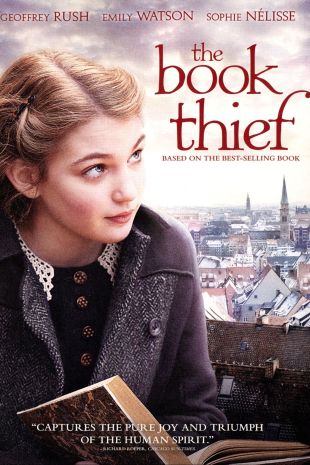
Director Brian Percival's adaptation of the international best-seller The Book Thief is the kind of earnest, handsomely produced, well-meaning, tearjerking historical drama that brings to mind the lament voiced by the character of Clarence in Quentin Tarantino's script for True Romance -- that there are too many unwatchable movies made from unreadable books. While that sentence is assuredly too harsh for this picture, the sentiment behind it rings true.
The film stars Sophie Nelisse as Liesel, who, as the story opens, is an 11-year-old girl living in Germany just before the start of World War II. Her mother is giving both Liesel and her younger brother up for adoption, but her sibling dies en route. As they perform a makeshift funeral, a small book drops from the pocket of one of the men and the young girl quickly pockets it -- letting us know that she is the title character.

She arrives in a small German town and meets her new stepparents, the severe Rosa (Emily Watson) and the playful Hans (Geoffrey Rush), who have chosen to care for unfamiliar children because of the monthly allowance it brings into their poor household. Liesel soon begins getting reading lessons from Hans and befriends a neighborhood boy named Rudy.
Although her new family is German, they do not belong to the Nazi party, which makes them objects of suspicion in the town. That paranoia grows even sharper when a teenage Jew named Max (Ben Schnetzer), who has a connection to Hans, shows up at their home and needs to be hidden from authorities. Liesel is forced to keep their secret, and Max turns out to be an excellent friend for the young girl.

The Holocaust is, understandably, a subject that primes an audience to cry, and when The Book Thief reveals in its opening minute that its disembodied narrator is the voice of Death itself, either your defenses go up immediately and you harden to stone or you settle in with a truck full of tissues. The movie so obviously wants to put you through the wringer that it's impossible to let yourself enjoy Liesel's fleeting moments of happiness, since you know they only exist so they can be crushed.
Having Death provide the narration for Liesel's life is an obvious literary conceit, and if it were the only one, it might not grate as much as it does here. Sadly, books, reading, and storytelling are all central themes of the movie -- even if you didn't know going in that it was a literary adaptation, it would be obvious almost immediately. Even with Florian Ballhaus' exquisite cinematography, which recalls the great Gordon Willis in its expressive use of darkness, The Book Thief is frustratingly uncinematic -- you can appreciate the artful visuals, but it ends up feeling like a checklist of scenes from a book, not a natural narrative that flows from one scene to the next.

The actors are uniformly strong, with Geoffrey Rush walking away with the movie as the gentle-hearted Hans. The character is no less of a contrivance than anything else in this overly designed story, but Rush gives him an undeniable humanity that makes the audience empathize with the toll that being a good man in a bad world takes on kind souls.
When the film finally reaches an ending that strains to maximize both tears of sadness and heartwarming uplift, some viewers will be a total emotional mess. Yet many others will feel like they just sat through a well-intentioned but ultimately empty book report.
